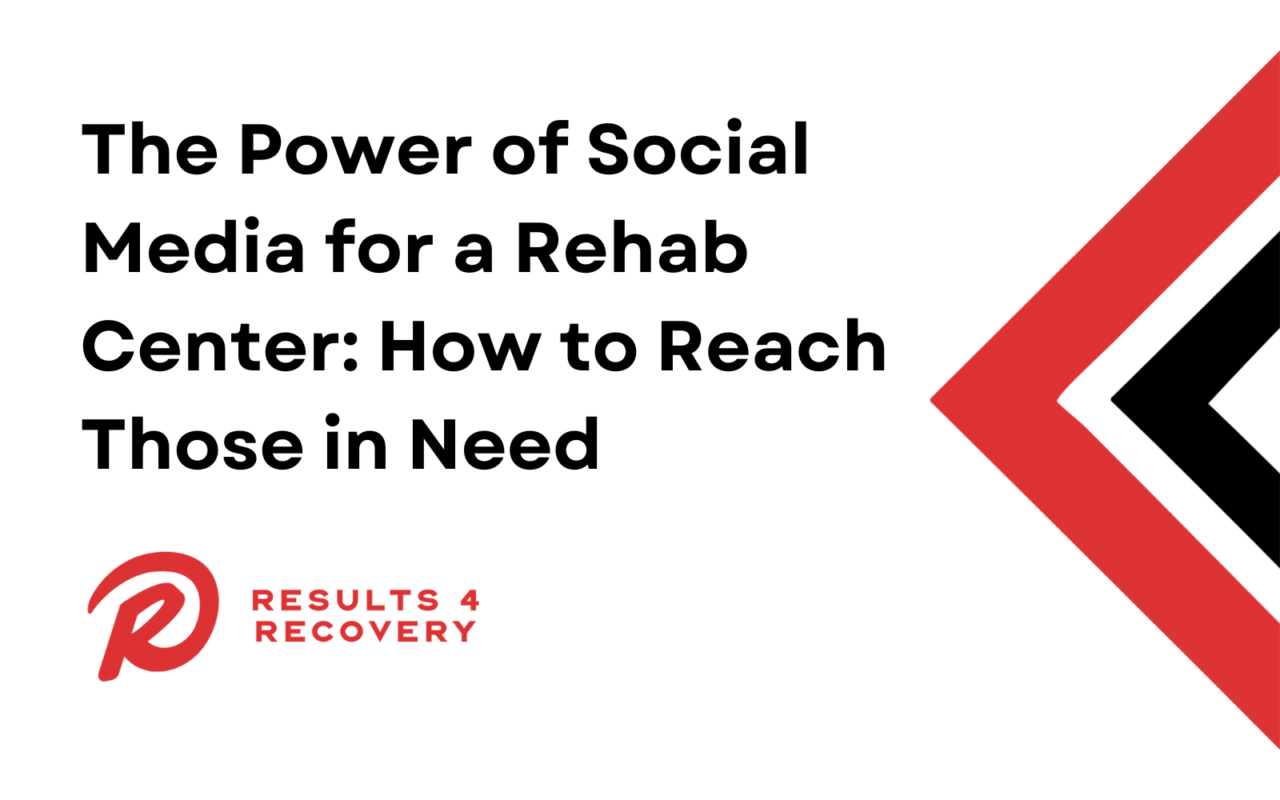In the fast-paced digital era, social media has transformed the way businesses, brands, and organizations communicate with their audience. While social media has often been viewed as a tool for entertainment and marketing, its power goes beyond just product promotion and brand awareness. For rehab centers, social media has become an essential platform that can change lives by reaching individuals who are seeking help for addiction or mental health challenges. Social media for a rehab center is more than just a way to advertise services; it’s a channel through which centers can offer guidance, support, and create a compassionate community for those who need it the most.
The unique advantage of social media is its vast reach, accessibility, and ability to create real-time connections. This is particularly important in the recovery space, where many individuals who need help are hesitant to reach out due to the stigma surrounding addiction and mental health. Social media allows rehab centers to break down these barriers and offer a welcoming, non-threatening platform for individuals to seek support, learn about treatment options, and begin their recovery journey.
In this long-form blog, we’ll explore the power of social media for a rehab center, including how it can help reach those in need, build trust and credibility, foster community support, and drive business growth. With these insights, rehab centers can leverage social media effectively to enhance their outreach, engage with their audience, and ultimately help more people find the support they need.
The Increasing Role of Social Media in Mental Health and Addiction Recovery
Before diving into how rehab centers can leverage social media, it’s essential to understand why it’s such an important tool in addiction and mental health recovery. Addiction and mental health disorders are often shrouded in stigma, with many individuals feeling ashamed or isolated due to their struggles. This stigma prevents them from seeking the help they need, whether it’s because they’re afraid of judgment, don’t know where to turn, or don’t feel comfortable talking to others about their challenges.
Social media has the power to break down these barriers. Platforms like Facebook, Instagram, and Twitter offer anonymity, allowing individuals to explore resources and connect with others without fear of being exposed. A person struggling with addiction or mental health issues may feel more comfortable learning about treatment options and success stories online before reaching out to a rehab center. Social media provides a safe space for these individuals to begin the conversation about recovery and find support from professionals, peers, and loved ones.
Moreover, social media is universally accessible and available around the clock. People searching for help are often in crisis or experiencing moments of vulnerability at odd hours of the day. Social media allows rehab centers to be accessible to individuals at all times, offering instant support and information that could make a significant difference in someone’s life.
How Social Media for a Rehab Center Can Build Trust and Credibility
Trust is a fundamental factor in recovery. Individuals seeking treatment for addiction or mental health disorders need to know that they are choosing a rehab center that will provide the care, expertise, and compassion they need to heal. Without trust, individuals are less likely to reach out for help, even if they are struggling.
Social media offers an excellent opportunity for rehab centers to build trust and credibility by showcasing their values, approach to treatment, and successes. Rehab centers can post testimonials from former clients, share real recovery stories, and highlight the positive outcomes that clients have experienced. These posts help humanize the center and make it more approachable for those considering treatment.
In addition to sharing success stories, rehab centers can use social media to share educational content that demonstrates their expertise. Posts about the latest trends in addiction treatment, mental health care, or recovery strategies show that the rehab center is committed to staying current and providing the best possible care for their clients. Informational content helps establish the center as an authority in the field and reinforces the message that the center’s team is knowledgeable, compassionate, and dedicated to the well-being of their clients.
Finally, transparency is a key aspect of building trust on social media. Sharing behind-the-scenes looks at the rehab center, such as the facilities, staff, and treatment programs, can give potential clients a sense of what to expect if they choose to seek help. This transparency creates a sense of openness, making it easier for individuals to trust the center and feel more comfortable reaching out.
Reaching Those in Need with Targeted Social Media Advertising
While organic posts are important for building trust and engagement, paid advertising is a powerful tool that can help rehab centers expand their reach and connect with individuals who are actively seeking help. Social media platforms like Facebook, Instagram, LinkedIn, and even YouTube offer highly targeted advertising options that allow rehab centers to reach specific demographics based on age, location, interests, behaviors, and even specific issues related to addiction and mental health.
For example, Facebook’s ad platform enables rehab centers to target individuals who are interested in mental health resources, addiction recovery, or related topics. Ads can also be targeted to individuals based on their behaviors, such as those who have recently searched for addiction treatment or mental health support. This allows rehab centers to create tailored ads that speak directly to the needs of potential clients, increasing the likelihood that they will engage with the content and seek help.
Paid ads are particularly effective in reaching people who may not be actively searching for rehab centers but could benefit from the services offered. By targeting individuals in crisis or those who have recently experienced trauma, rehab centers can ensure that their ads are seen by those who need help the most. This type of outreach can lead to more inquiries, consultations, and ultimately, more clients seeking treatment.

Creating Engaging Content to Connect with Your Audience
Engagement is a critical aspect of using social media for a rehab center. Posting valuable content not only helps increase your center’s visibility but also encourages individuals to engage with your posts, share them with others, and ultimately reach out for help. Engaging content can take many forms, including educational blog posts, inspirational quotes, videos, infographics, and live Q&A sessions.
For rehab centers, educational content is a key strategy. Posts about the signs of addiction, coping strategies for mental health challenges, and the benefits of seeking professional help can educate individuals who may be struggling but don’t know where to turn. Informing people about the different treatment options available and explaining what the recovery process entails can also help reduce any fears or misconceptions about rehab.
Video content is another powerful way to engage with potential clients. Videos showcasing the rehab center’s programs, sharing success stories, or even providing virtual tours of the facility can give individuals a sense of what to expect and help them feel more comfortable with the idea of seeking help. Video content is more likely to be shared and can help your message reach a wider audience.
Motivational quotes and success stories can inspire others who are struggling with addiction or mental health disorders. These posts show that recovery is possible and that the path to healing is worth pursuing. Highlighting real stories of people who have successfully overcome addiction can provide hope to those who are on the fence about seeking help.
Building a Supportive Community Online
One of the greatest benefits of social media is its ability to build a supportive community. Rehab centers can use social media to create a space where people can come together to share their experiences, offer support, and find encouragement. Creating a private or closed Facebook group, hosting live recovery meetings on platforms like Instagram Live or Zoom, or encouraging followers to comment and interact with each other can foster a sense of belonging.
This community aspect is crucial in addiction recovery, as people who are recovering often feel isolated. Social media provides a platform where they can connect with others who are going through similar experiences, ask questions, and offer support. It also allows rehab centers to share ongoing support resources, such as sober living tips, mindfulness practices, and relapse prevention strategies.
Building an online community also helps keep individuals connected with your rehab center long after they’ve completed treatment. Engaging with former clients and encouraging them to participate in your social media community ensures that they continue to feel supported and motivated on their recovery journey.
Tracking and Measuring the Success of Your Social Media Strategy
One of the greatest advantages of social media for a rehab center is the ability to track and measure your success. Every social media platform provides in-depth analytics that can show how your posts are performing, which content is resonating with your audience, and what actions followers are taking as a result of your posts.
For example, Facebook’s Insights tool shows the number of people who have viewed, liked, shared, and commented on your posts. It also provides data about the demographics of your audience, including their age, location, and interests. This information helps you understand what’s working and what needs improvement, allowing you to adjust your content strategy accordingly.
Instagram’s analytics provide similar data, including the number of followers gained, post engagement, and reach. These insights help you understand which posts are generating the most interest and engagement, allowing you to focus on creating more of the content that resonates with your audience.
Tracking these metrics allows rehab centers to optimize their social media strategy, ensuring that they are reaching the right people, delivering the right messages, and providing the support that individuals need to begin their recovery journey.
Why Choose Results 4 Recovery
At Results 4 Recovery, we understand the unique challenges that rehab centers face in reaching and engaging individuals who are struggling with addiction or mental health issues. With years of specialized experience in digital marketing within the addiction and recovery space, we’ve honed a deep understanding of how to effectively use social media for a rehab center. Our team creates customized strategies tailored to your center’s specific needs, ensuring your message resonates with the right audience at the right time. We focus on building trust, fostering authentic connections, and creating a supportive online community that encourages individuals to take the first step toward recovery. From increasing visibility through targeted campaigns to engaging content that educates and inspires, we’re committed to amplifying your center’s online presence and impact. With our data-driven approach, we can track and optimize campaigns for maximum effectiveness, ensuring your resources are put to the best possible use. When you choose Results 4 Recovery, you gain a dedicated partner who’s passionate about helping more people find the treatment and support they deserve. Let us help you leverage the power of social media to make a real difference in the lives of those in need.
The Future of Social Media for Rehab Centers
The power of social media for a rehab center cannot be overstated. Social media provides rehab centers with the tools to reach individuals in need, build trust and credibility, engage with their audience, and foster a supportive community. By leveraging social media effectively, rehab centers can break down the stigma surrounding addiction and mental health, offer guidance and support, and ultimately help more people find the treatment they need to heal.
At Results 4 Recovery, we understand the impact that social media can have on reaching those in need. Whether you’re looking to increase your visibility, connect with potential clients, or build a supportive community, we can help you harness the power of social media to grow your rehab center’s presence and make a difference in people’s lives. Social media for a rehab center is an invaluable tool, and with the right strategy, it can transform the way you reach and support those who need help most. For more information, visit our website https://results4recovery.com/!


